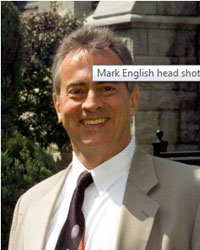Tax relief can solve many of the county’s problems, says Democratic candidate Mark English.
English, a family-practice lawyer, is running for the Onondaga County Legislature for District 15. He faces Ryan McMahon, R-Syracuse, who is serving his third term on the Syracuse Common Council from the city’s District 3.
The county District 15 includes the center of Onondaga County, including the southwestern corner of Geddes, Solvay and a small southern portion of the city of Syracuse. Election Day is Nov. 8.
Democracywise posed three questions on key issues to the candidates in the contested open-seat races.
Here are the responses from Mark English:
Taxes
Q: What, if anything, do you think should be done about county taxes? Please be specific on tax proposals or budget cuts. How would you get the money required to provide public services? Raise taxes? Increase fees for services? Which? What, if any, specific services or programs would you cut to balance the county budget?
A: “In this economic climate, it’s difficult to reduce taxes meaningfully. Meaningful tax relief comes when you have more employment. Not casinos, not malls, but careers that you could raise your families with. More jobs would build the tax base up, which might reduce taxes. But I’ll admit, I’d have a hard time promising reduced taxes. I don’t really know. I’d have to wait and see.”
Young People
Q: Keeping and attracting young people is a long-standing concern for our region. What, specifically, do you think the Onondaga County government should do to make the area more attractive to young workers and their families?
A: “Targeted tax relief. Targeted tax relief would be for job creators as an incentive to create jobs to receive tax benefits. More jobs would definitely bring people in. But we should also pursue less expensive power for consumers. I’d like to see a regional power authority to provide power to consumers and employees. Regional could be the entire central New York area, and it’s already being done in other places, like Messina and Solvay.”
Van Duyn and Long-Term Care
The county-owned Van Duyn nursing home provides long-term care to many of the county’s elderly. But Van Duyn is in deep financial trouble. Last year, taxpayers absorbed about $5.7 million of Van Duyn’s costs and taxpayers are expected to absorb another $3 million this year. As of March 1, 2011, the state also cut off Medicare and Medicaid payments for new admissions to the nursing home, citing unsafe conditions there. And since March, county officials and Upstate Medical University have been negotiating for Upstate to take over the home. But Upstate has not yet agreed, citing concerns about whether the state can subsidize Van Duyn. If the home closes, it’s unclear what will become of Van Duyn’s residents. At the same time, the county’s population — like the rest of the nation’s — is aging and many will need long-term care.
Q: What if anything do you think the county government can or should do to keep Van Duyn from closing? What else, if anything, can or should the county government do to meet the long-term care needs of our aging population?
A: “I’m not too well versed on that. I think I guess what we have to do is, in the future, make sure we can support those kinds of programs. Outright termination of programs is an ongoing problem, especially here.” As two examples, he cited the recently closed Ida Benderson center for seniors and the Syracuse Symphony. “I hope we can reduce taxes to help this type of thing. Lower taxes might help save some of these organizations.” He is open to consolidating some government services, he said. “We could consolidate on any kind of community purchasing, maybe police. We can certainly look into that — also infrastructure, road maintenance, all that.”
(Sara Tracey is a senior in newspaper journalism.)
-30-



